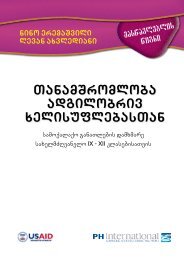The Geneva Protocol, by David Hunter Miller
The Geneva Protocol, by David Hunter Miller
The Geneva Protocol, by David Hunter Miller
You also want an ePaper? Increase the reach of your titles
YUMPU automatically turns print PDFs into web optimized ePapers that Google loves.
CHAPTER VII. 31<br />
And it must not be forgotten that it is not only the wicked powers of Europe that have acted along these lines.<br />
In reference {44} to the affairs of other countries, though not its own, the United States has maintained this<br />
privilege of paternal intervention <strong>by</strong> force. We maintained it, for example, in Cuba in 1898, chiefly on the<br />
ground of the sake of humanity.[20] In connection with the Panama Canal, Mr. Root set up the famous<br />
proposition[21] that the sovereignty of Columbia over the Isthmus was limited and qualified <strong>by</strong> the general<br />
right of mankind to have a canal between the Atlantic and the Pacific, and to have that canal kept open for the<br />
commerce of all.<br />
Many other instances might be cited. It is, however, worth while to recall in connection with this alleged<br />
limited right of sovereignty of Columbia over part of its territory that the United States subsequently paid<br />
$25,000,000 to the owner of the qualified fee.<br />
It is perhaps unnecessary to add that this alleged right of intervention, as between great powers, was<br />
recognized <strong>by</strong> another name as a method of changing the status quo, namely, the method of war.<br />
<strong>The</strong> effect of the <strong>Protocol</strong> is unquestionably to consecrate the international status quo with a definite position<br />
of legality, not to be disturbed <strong>by</strong> force.[22] <strong>The</strong> views of the writers, as opposed to the practice of Great<br />
Powers, have been adopted.<br />
Article 2 of the <strong>Protocol</strong> forbids a resort to war[23] as against any {45} other State, a party to the <strong>Protocol</strong>,<br />
"except in case of resistance to acts of aggression."[24]<br />
Under Article 8, every Signatory agrees to abstain from any act which might constitute a threat of aggression.<br />
Under these provisions and the provisions of the <strong>Protocol</strong> for the settlement of international disputes,<br />
intervention to upset the status quo (or to prevent a state from changing it where it legally may) becomes<br />
aggression and is an international crime.<br />
[1] Such as discovery, occupation of terra nullius, etc. See the Treaty of Spitzbergen, A. J. I. L., Vol. XVIII,<br />
p. 109.<br />
[2] A. J. I. L., Vol. XI, at p. 626.<br />
[3] A.J. I. L, Vol. XI, Supp. 1917, p. 53.<br />
[4] Some regions of Asia may be exceptions.<br />
[5] See the Franco-Swiss Free Zones, <strong>by</strong> Louis Schulthess, in Foreign Affairs, Vol. 3, No. 2, p. 331, with map.<br />
[6] "Et il faut bien remarquer, que la Guerre ne décide pas la question; la Victoire contraint seulement le<br />
vaincu à donner les mains au Traité qui termine le différend. C'est une erreur non moins absurde que funeste,<br />
de dire, que la Guerre doit décider les Controverses entre ceux qui, comme les Nations, ne reconnoissent point<br />
de Juge." Vattel, Book III, Section 38.<br />
[7] In general, this is the theory of Article Ten of the Covenant.<br />
[8] See the Genesis of the War, Asquith, pp. 97, 98.<br />
[9] Article 15.<br />
[10] President Wilson's so-called first draft of the Covenant contained a provision along these lines in Article<br />
III. See Woodrow Wilson and World Settlement, Baker, Vol. III, p. 89.
















